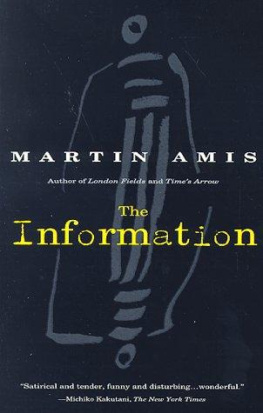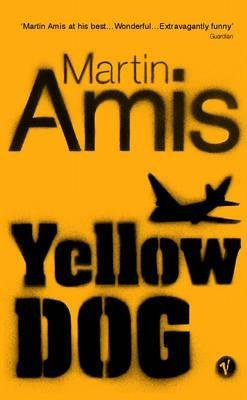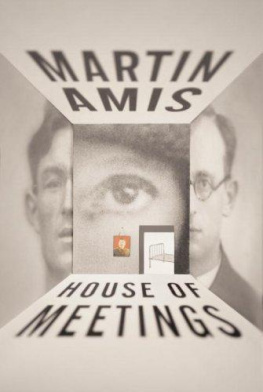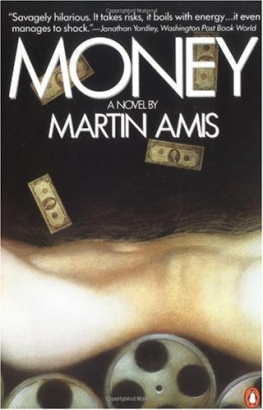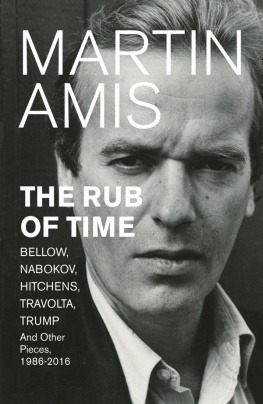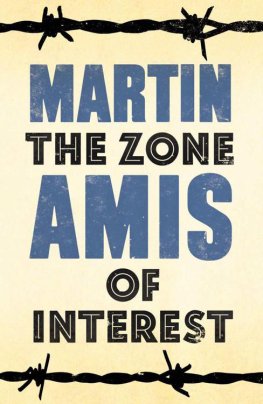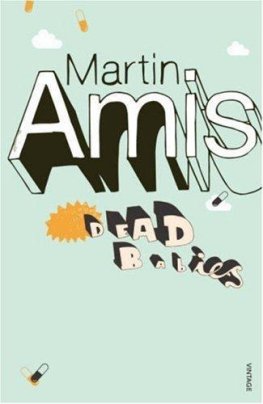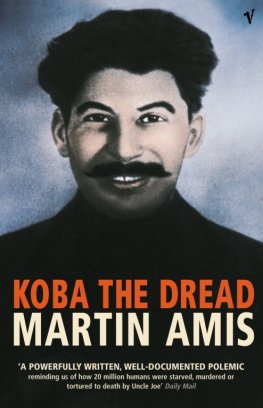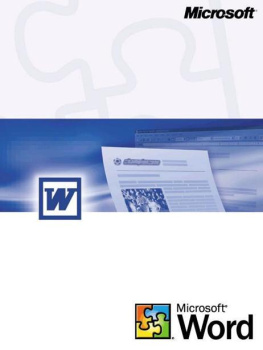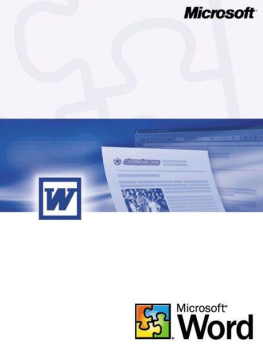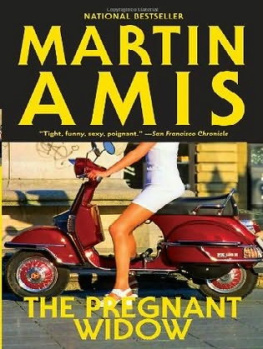Martin Amis - The Moronic Inferno and Other Visits to America
Here you can read online Martin Amis - The Moronic Inferno and Other Visits to America full text of the book (entire story) in english for free. Download pdf and epub, get meaning, cover and reviews about this ebook. year: 1991, publisher: Penguin (Non-Classics), genre: Detective and thriller. Description of the work, (preface) as well as reviews are available. Best literature library LitArk.com created for fans of good reading and offers a wide selection of genres:
Romance novel
Science fiction
Adventure
Detective
Science
History
Home and family
Prose
Art
Politics
Computer
Non-fiction
Religion
Business
Children
Humor
Choose a favorite category and find really read worthwhile books. Enjoy immersion in the world of imagination, feel the emotions of the characters or learn something new for yourself, make an fascinating discovery.

- Book:The Moronic Inferno and Other Visits to America
- Author:
- Publisher:Penguin (Non-Classics)
- Genre:
- Year:1991
- Rating:5 / 5
- Favourites:Add to favourites
- Your mark:
- 100
- 1
- 2
- 3
- 4
- 5
The Moronic Inferno and Other Visits to America: summary, description and annotation
We offer to read an annotation, description, summary or preface (depends on what the author of the book "The Moronic Inferno and Other Visits to America" wrote himself). If you haven't found the necessary information about the book — write in the comments, we will try to find it.
The Moronic Inferno and Other Visits to America — read online for free the complete book (whole text) full work
Below is the text of the book, divided by pages. System saving the place of the last page read, allows you to conveniently read the book "The Moronic Inferno and Other Visits to America" online for free, without having to search again every time where you left off. Put a bookmark, and you can go to the page where you finished reading at any time.
Font size:
Interval:
Bookmark:
THE MORONIC INFERNO
Martin Amis was born in Oxford on 15 August 1949. He was educated in Britain, Spain and the USA, attending over thirteen schools and then a series of crammers in London and Brighton. He gained a formal First in English at Exeter College, Oxford. He has been an editorial assistant on The Times Literary Supplement and was Literary Editor of the New Statesman from 1977 until 1979. He then worked as a Special Writer on the Observer and now contributes regularly to the Independent on Sunday. He is also the author of Einstein's Monsters, a collection of stories about the nuclear age, and his novels are The Rachel Papers, which won the 1974 Somerset Maugham Award, Dead Babies, Success, Other People: A Mystery Story, Money, London Fields and Time's Arrow .
His novels have won widespread acclaim: writing about Success, Blake Morrison in The Times Literary Supplement said, 'The narrative economy and manipulation of sympathy make this Martin Amis's most assured work so far. The presentation of city life in its sadness is forceful in itself, but what is especially impressive is that all the detail counts in the overall design'; J. G. Ballard called Other People 'Powerful and obsessive ... a metaphysical thriller. Kafka reshot in the style of Psycho', and the Sunday Times thought it 'dazzling... obligatory reading'. Reviewing Einstein's Monsters in the London Evening Standard, John Walsh wrote, 'The writing remains as vivid as ever, full of risky, throw-away conceits and perfectly cadenced terms of description.' London Fields was praised in the Sunday Telegraph as 'The most ambitious Amis to date, the most compassionate, and the most chilling... [his] voice has been the most original and distinctive of British fiction writers in the 1980s' while the Guardian wrote of Time's Arrow. 'Amis's profound book adds a new and terrifying dimension to the Shakespearean tragic conception of time being "out of joint".
MARTIN AMIS
The Moronic Inferno
and Other Visits to America
PENGUIN BOOKS
Copyright Martin Amis, 1986
To Christopher, Eleni and Alexander
Contents:
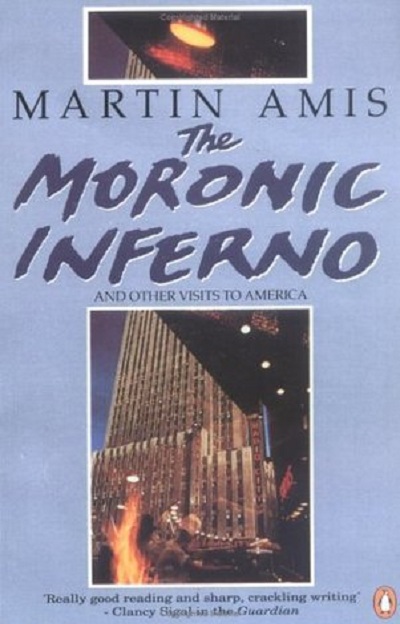
Introduction and Acknowledgments
On a couple of occasions I have been asked to write a book about America; and I must have spent at least four or five minutes contemplating this monstrous enterprise. America is more like a world than a country: you could as well write a book about people, or about life. Then, years later, as I was up-ending my desk drawers to prepare a selection of occasional journalism (and this book is offered with all generic humility), I found that I had already written a book about America unpremeditated, accidental, and in instalments. Of the hundreds of thousands of words I seem to have written for newspapers and magazines in the last fifteen years, about half of them seem to be about America. I hope these disparate pieces add up to something. I know you can approach America only if you come at her from at least a dozen different directions .
The academic year 195960 I spent as a ten-year-old resident of Princeton, New Jersey. I was the only boy in the school the only male in the entire city - who wore shorts. Soon 1 had long trousers, a crew cut, and a bike with fat whitewalls and an electric horn. I ate Thanksgiving turkey. I wore a horrible mask on Hallowe'en. America excited and frightened me, and has continued to do so. Since that time I have spent at least another year there, on assignment. My mother lived in America for years, and many of my expatriate friends live in America now. My wife is American. Our infant son is half-American. I feel fractionally American myself .
Oh, no doubt I should have worked harder, made the book more representative, more systematic, et cetera. It remains, however, a collection of peripatetic journalism, and includes pieces where the travel is only mental. I have added links and postscripts; I have wedged pieces together; I have rewritten bits that were too obviously wrong, careless or bad. I should have worked harder, but it was quite hard work getting all this stuff together (photocopying back numbers of journals can be a real struggle, what with the weight of the bound volumes and that Xerox flap tangling you up and getting in the way). And it was hard work writing it all in the first place. Journalists have two ways of expending energy: in preparation and in performance. Some exhaust themselves in securing the right contacts, the intimate audits, the disclosures. I am no good at any of that. I skimp it, and so everything has to happen on the typewriter. I find journalism only marginally easier than fiction, and book-reviewing slightly harder. The thousand-word book review seems to me far more clearly an art form (however minor) than any of the excursions of the New Journalism, some of which are as long as Middlemarch .
All these pieces were written left-handed. They were written, that is to say, not for my own satisfaction but for particular editors of particular journals at particular times and at particular lengths. The hack and the whore have much in common: late nights, venal gregariousness, social drinking, a desire to please, simulated liveliness, dissimulated exhaustion you keep on having to do it when you don't feel like it. (Perhaps this bond accounts for the hypocritical burnish of the vice-entrapment story, where in the end the reporter always makes his excuses and staggers off nobly into the night.) Insidious but necessary is the whorish knack a journalist must develop of suiting his pitch to the particular client. Luckily it all seems to be done subliminally. You write like this for the London Review of Books, and you write like that for the Sunday Telegraph Magazine. You can swear here but you can't swear there. (I have greatly enjoyed debowdlerising these pieces and restoring cuts, some of which, as in the Brian De Palma profile, approached about 80 per cent of the whole.) The novelist has a very firm conception of the Ideal Reader. It is himself, though strangely altered older, perhaps, or younger. With journalism the entire transaction is much woollier: every stage in the experience seems to involve a lot of people .
I got the phrase 'the moronic inferno', and much else, from Saul Bellow, who informs me that be got it from Wyndham Lewis. Needless to say, the moronic inferno is not a peculiarly American condition. It is global and perhaps eternal. It is also, of course, primarily a metaphor, a metaphor for human infamy: mass, gross, ever-distracting human infamy. One of the many things I do not understand about Americans is this: what is it like to be a citizen of a superpower, to maintain democratically the means of planetary extinction? I wonder how this contributes to the dreamlife of America, a dreamlife that is so deep and troubled. As I was collating The Moronic Inferno (in August 1985, during the Hiroshima remembrances), I was struck by a disquieting thought. Perhaps the title phrase is more resonant, and more prescient, than I imagined. It exactly describes a possible future, one in which the moronic inferno will cease to be a metaphor and will become a reality: the only reality .
I am particularly grateful to The Observer, under whose auspices, in effect, this book was written; I am also indebted to the New Statesman, the Sunday Telegraph Magazine, the London Review of Books, Tatler and Vanity Fair. Throughout I have been exceptionally lucky in my editors and colleagues, and here salute them, in roughly chronological order: Terence Kilmartin, Arthur Crook, John Gross, Claire Tomalin, Anthony Howard, Julian Barnes, Deirdre Lyndon, Donald Trelford, Miriam Gross, Trevor Grove, Karl Miller and Tina Brown. Special thanks are due also to Ian Hamilton and to Cle Peploe .
Next pageFont size:
Interval:
Bookmark:
Similar books «The Moronic Inferno and Other Visits to America»
Look at similar books to The Moronic Inferno and Other Visits to America. We have selected literature similar in name and meaning in the hope of providing readers with more options to find new, interesting, not yet read works.
Discussion, reviews of the book The Moronic Inferno and Other Visits to America and just readers' own opinions. Leave your comments, write what you think about the work, its meaning or the main characters. Specify what exactly you liked and what you didn't like, and why you think so.

